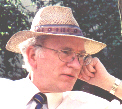

Hans-Joachim Niemann
Dr. rer.nat.
scientist, philosopher, translator, lecturer.
I was born in 1941 in Kiel in Northern Germany during a bomb raid. Since then I hate noise. Later I learned something more about World War II and those who unleashed it. The question 'How could this possible happen?' (that is: Nazi-Germany) became a life-long problem for me and my generation. As a child I lived in Halle/Saale (East Germany, German Democratic Republic). After twelve years inside a leftist totalitarian state I had got two of those 'How could this possible happen?' problems. What I at least have learnt from it: Replace the political question of 'right or left?' by the moral question of 'right or wrong?'. Many years after these experiences I became a quite enthusiastic reader of Karl Popper and Hans Albert.
I had lived in many parts of Germany, before I preferred staying in Bavaria, where I am a resident now for over 40 years. When I look out of my window I take pleasure in seeing a part of the 'Frankonian Swiss'. Frankonia belongs to Bavaria, - thanks to Napoleon who came to tidy things up some 200 years ago in the Holy Roman Empire of the German Nation - actually there existed not one, but more than 300 little states.
I studied physics, philosophy and chemistry at the universities of Kiel, Munich, Marburg and Tübingen resulting in a couple of papers in physical chemistry and a thesis in the field of laser-induced chemistry. In Tübingen, I became a 'Diplom-Chemiker', a qualified chemist, in 1969 and I got a doctorate in 1972.
Since 1969 I live with computers. The first one at the University of Tübingen was as big as a house ("Rechenzentrum"), fed with punch cards. It had a memory of only 64 Kilobytes. So you had to write very sophisticated programs because of the poor RAMs. Similar to the 'on-board computer' in our head, the main problem was: the more words and numbers you stored, the less capacity was left for the program code. From that I learned why there are encyclopedic people on the one hand and thinking ones on the other. As for me, I decided to be a thinker, if necessary at the expense of RAMs for those many facts of extensive historical knowledge. However, I admire those eggheads who have enough RAMs for both: facts and thinking.
Until 1973 I was busy doing postdoc research for the German Research Foundation ('Deutsche Forschungsgemeinschaft') and training students in thermodynamics at the University of Tübingen. Then, for eleven years, I was with 'Kraftwerkunion AG' (Siemens AG). My research was about chemical reactions induced by UV-laserlight. None of my results were allowed to being published. But there are many patents reporting of my then activities.
In 1984 I became a freelance writer. I changed to research in the field of philosophy of science and a few years later, I gave lectures on critical rationalism at the University of Bamberg/Frankonia as well as for the Fränkische Gesellschaft für Philosophie in Bamberg and for the Gesellschaft für Kritische Philosophie (GKPN) in Nürnberg. Both regional Frankonian Societies of Philosophy which I co-founded were supposed to address people interested in philosophical problems.
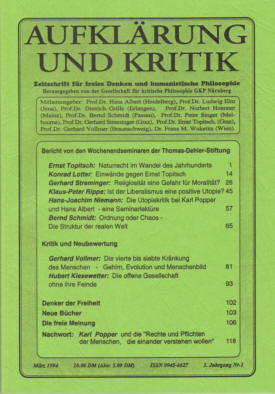
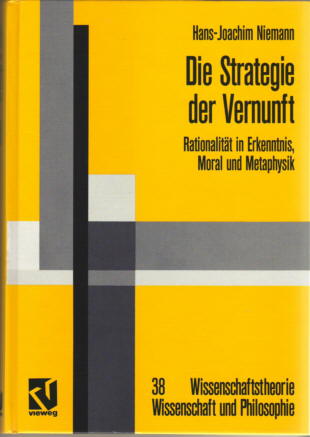
In 1993 I published my first book Die Strategie der Vernunft - Rationalität in Erkenntnis, Moral und Metaphysik (The Strategy of Reason - Rationality in the Fields of Knowledge, Morals and Metaphysics), Vieweg, Braunschweig/Wiesbaden.
In 1994 I co-founded the philosophical journal Aufklärung und Kritik (Enlightenment and Criticism) and I gave a weekly guest lecture on 'Rational Decisions' at the University of Passau/Bavaria for students working on the theory of systems (Prof. Bernd Schmidt).
In the same year I was invited to visit Karl Popper in his home in Kenley because my 'Strategy of Reason' had met with his approval. As well important to me: I met also Hans Albert in Heidelberg after having had some correspondence with him.
From 1993 to 1999 I gave lectures and courses at the University of Bamberg/ Frankonia: I lectured on critical rationalists like Karl Popper, Hans Albert, Imre Lakatos, Paul Feyerabend as well as on Bertrand Russell, Peter Singer and John Leslie Mackie or topics like the philosophy of the Cercle of Vienna or the principle of reponsibility (Hans Jonas).
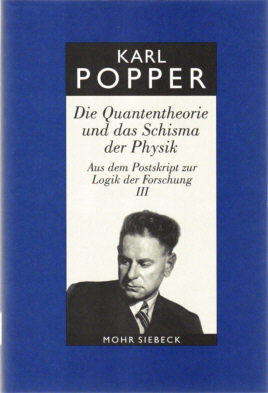 In
1999 I finished the translation into German of Karl Popper's Quantum
Theory and the Schism in Physics : "Die Quantentheorie und das Schisma in
der Physik",
Mohr Siebeck, Tübingen 2001;
In
1999 I finished the translation into German of Karl Popper's Quantum
Theory and the Schism in Physics : "Die Quantentheorie und das Schisma in
der Physik",
Mohr Siebeck, Tübingen 2001;
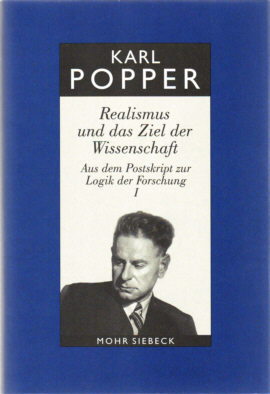 2001: translation
into German
of Karl Popper's Realism and the Aim of Science: "Realismus und das
Ziel der Wissenschaft" Mohr
Siebeck, Tübingen 2002.
2001: translation
into German
of Karl Popper's Realism and the Aim of Science: "Realismus und das
Ziel der Wissenschaft" Mohr
Siebeck, Tübingen 2002.
From 2002 up to now: studies on topics as: ethics as a Science, problem-solving ethics, open problems in Critical Rationalism and a lot of sharp criticism of contemporary philosophy (A. Sokal, N. Rescher, L. Puntel, V. Hösle, H.O. Apel, W. Schnädelbach, Wohlrapp, Schurig, Schurz, C. v. Weizsäcker, W. Welsch, H. Lenk, M- Mahrig, etc.)
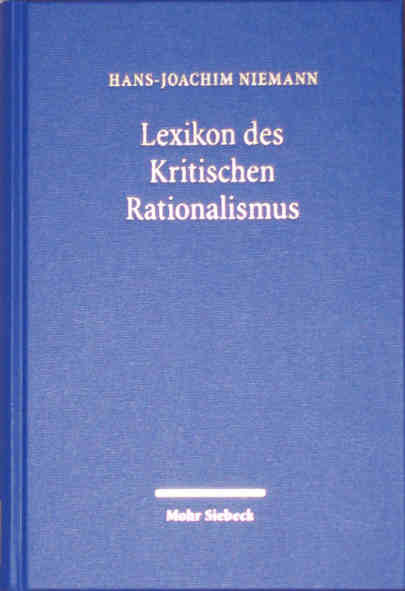
In 2004
I published Lexikon des Kritischen Rationalismus (Dictionary of
Critical Rationalism)
Mohr Siebeck, Tübingen 2004; paperback in 2006.

2006 I: 3 Wikibooks (like Wikipedia everyone is invited to cooperate and to contribute):
Studienführer Hans Albert (Hans Albert Companion)
Sei doch vernünftig - Ein Crash-Kurs (Be Reasonable! a Crash Course)
Studienführer Norbert Hoerster (Norbert Hoerster Companion)
2006 II: About Tolerance - criticisme of and proposals for changing the UN-Charta "The Responsibility to Protect" in: E. Hilgendorf (Hrsg.), Wissenschaft, Religion und Recht - Hans Albert zum 85. Geburtstag: Über die Grenzen der Toleranz und 'objektive Toleranz' als Instrument der Gewaltminimierung, Berlin (LOGOS) 2006, S. 313-338. (The proposed changes: (1) Victims of all nations are counted equally. (2)Reducing violence. (1) and (2) is more important and easier to achieve than the R2P (The Responsibility to Protect) which demands from the nations to shift parts of their sovereigny to UN.
2008 I: Essais and articles to improve philosophy: against alarmism, populism and hyperbolism. Philosophy should be problem solving, rather than discussing definitions and concepts.
2008 II: Man Can Control Chance by Changing Propensities and Serendipities, in German, "Propensity und Serendipity - Zwei Leitideen steuern den glücklichen Zufall", Aufklärung und Kritik 1 (2008), S. 48-73.
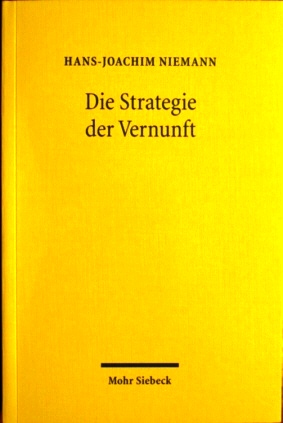 2008
III:
2008
III:
Die Strategie der Vernunft - Problemlösende Vernunft, rationale Metaphysik und Kritisch-Rationale Ethik (The Strategy of Reason - Problemsolving Rationality, Rational Metaphysics and Critical-Rationalistic Ethics), revised and extended edition of the book of 1993, Tübingen (Mohr Siebeck) 2008.
see via google Niemann+Strategie.
2011 Die Nutzenmaximierer. Der aufhaltsame Aufstieg des Vorteilsdenkens (The Utility maximizers. The Resistabel Rise of Selfishness), Tübingen (Mohr Siebeck) 2011, 230 S. see via google Niemann+Nutzenmaximierer
2009-2012 Translation into German and edition of Karl Popper's Knowledge and the Body Mind-Problem and The Self and Its Brain in: Karl Popper, Gesammelte Werke, Band 12: Wissen und das Leib-Seele-Problem, Tübingen (Mohr Siebeck) 2012.
When asked about my philosophical interests, I would like to stress the point that you can handle philosophical problems like an engineer. Therefore, I propose decision schemes for solving practical problems in the field of morals or even metaphysics. Apart from this, I consider it to be of necessitiy to criticize the scientific standards of philosophy. There is something deeply wrong in contemporary philosophy. The institution of criticism doesn't work as it should do and as it still does in science, where I was used to handle it. The widespread anything-goes-relativism makes everything immune against criticism. Consequently any publications up to nonsense are possible and their evaluation is mistakenly made by means of measuring public success. Public success however is in many cases fabricated on the grounds of what one may call 'philosophical populism' (alarmism, populism, hyperbolism), which works by repeating and reinforcing the prejudices of the public. A discussion about the significance of problems and the testability of the proposed solutions - that is what I miss.